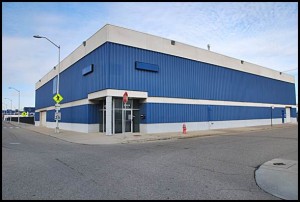Center has one more hurdle to go

It looks like an Islamic Center will get the go-ahead to open in what was formerly an industrial building on St. Aubin.
By Charles Sercombe
It looks like an Islamic center will get the go-ahead to operate in a 52,000-square-foot industrial building on St. Aubin and Faber.
On Wednesday evening, the Plan Commission, which includes Mayor Karen Majewski and City Councilmember Tom Jankowski, agreed to recommend the city council approve a rezoning proposal for that area.
The area, which includes St. Aubin St. from Holbrook to Denton, would be rezoned from strictly industrial use to a mixed use of light industrial, commercial and religious centers.
The Abu Bakr Al-Siddique Islamic Center bought the former American Axle building and nearby parking lots on St. Aubin for $500,000. According to the organization’s website, donations came in from around the world. The group also took out a $150,000 loan, which it is still paying back.
According to the Vice President of the center, Akram Omasan, the site will offer a host of activities for the Muslim and non-Muslim communities. It will also be a mosque.
The last hurdle for the center to jump is getting final approval from the city council. The proposal could be considered as soon as the next city council meeting this Tuesday.
It’s likely that at the very least a bare majority of the council will OK the new zoning designation.
Other approved uses for the site include car repair, micro-brewery, wine brewery, manufacturing, warehousing, medical marijuana facility, food processing and other uses.
Plan Commissionmember Steve Cherry said the mixed bag of uses was proposed to take care of a number of issues. He said the mixed use concept acts as a “buffer” to the neighboring residential area on Lumpkin St.
At Wednesday’s meeting, two residents spoke out against allowing religious centers from being permitted.
Susan Dunn of Hewitt St. said that the city can’t afford to allow tax-exempt entities to operate in commercial zones. Religious centers, churches, mosques and temples are not required to pay property taxes.
The building where the center will be located brings in $14,000 a year in property taxes.
“The city has very limited commercial and industrial areas,” Dunn said.
Religious centers, she said, will “dwindle our tax base.”
“If we’re no longer able to pay our bills … our future is at stake.
Michael Nemeth of Lumpkin St. said the city has too many mosques, and he doesn’t want to hear the call to prayer.
Omasan said that the center will attract people to move to Hamtramck and buy houses. He said taxes from two or three houses will make up the loss of property taxes from the building.
“Think about the increase,” he said of people moving to Hamtramck. “It will be tenfold.”
“People will invest, he added.
The issue of mosques and Islamic centers taking over commercial properties has stirred debate in recent weeks. One of the more controversial decisions came from the Zoning Board of Appeals, which allowed an Islamic center to set up in a commercial building at the northwest corner of Jos. Campau and Caniff – the very center of the city’s main business district.
There are also two other Islamic centers within that block that were given the OK to take over commercial buildings.
In her Facebook page, Mayor Majewski was critical of allowing the Jos. Campau and Caniff building to be used as a religious center.
“This building has been the victim of the recession, but now that the economy is turning around, the city should be preserving and promoting our walkable, traditional urban downtown as a place to do business, to shop, eat and have fun,” Majewski said. “To turn this pivotal corner into a place that does not generate taxes and does not promote our central business district as a retail and business destination is shortsighted and small-minded, to put it generously.”

